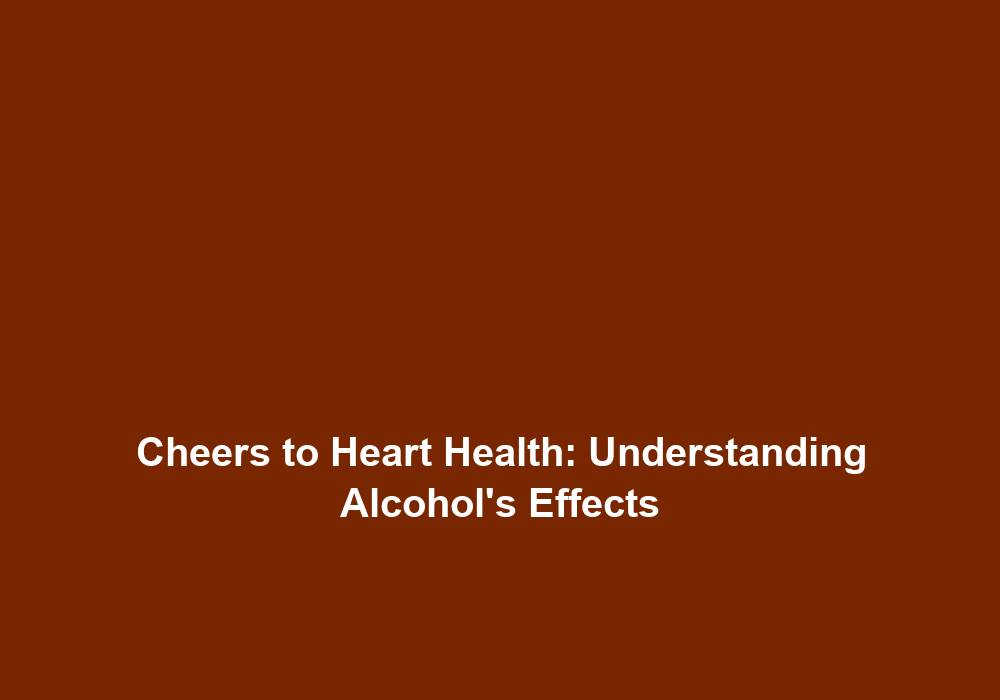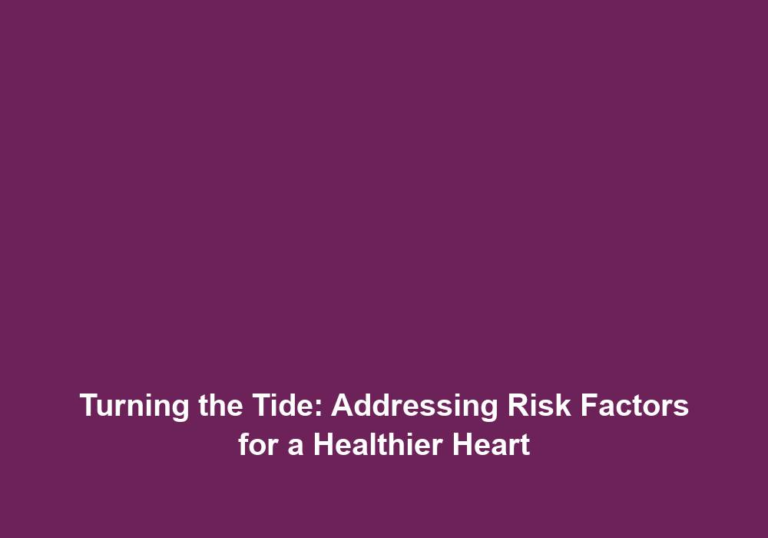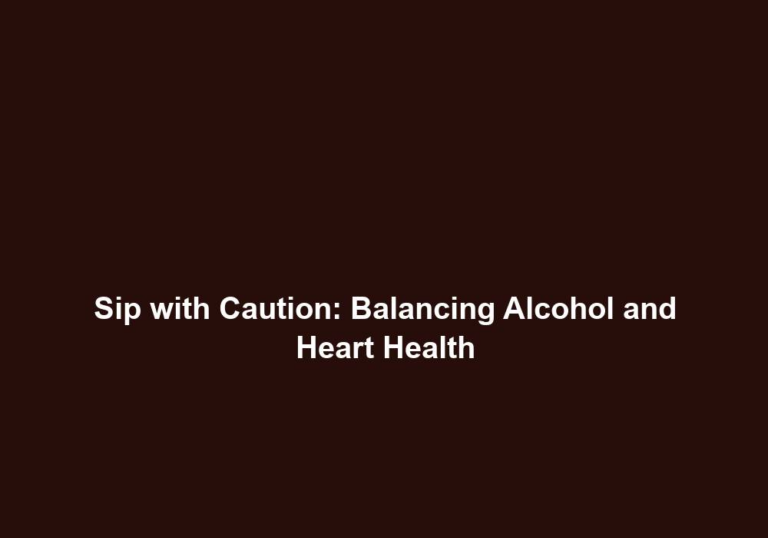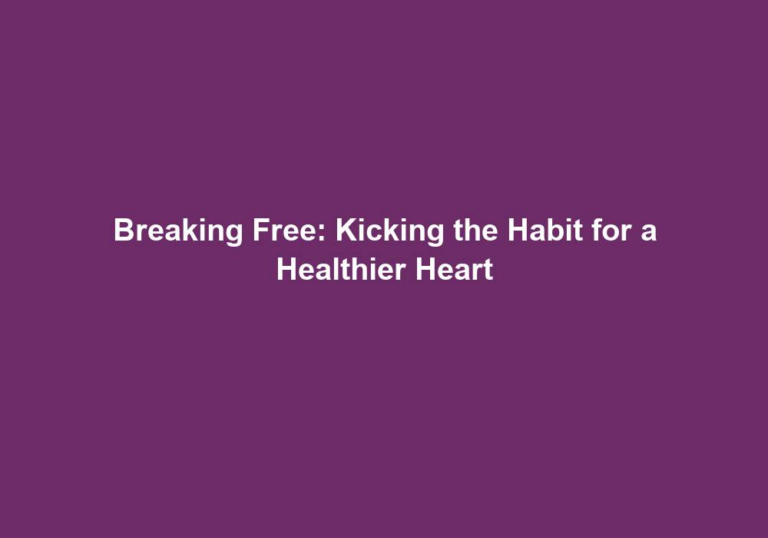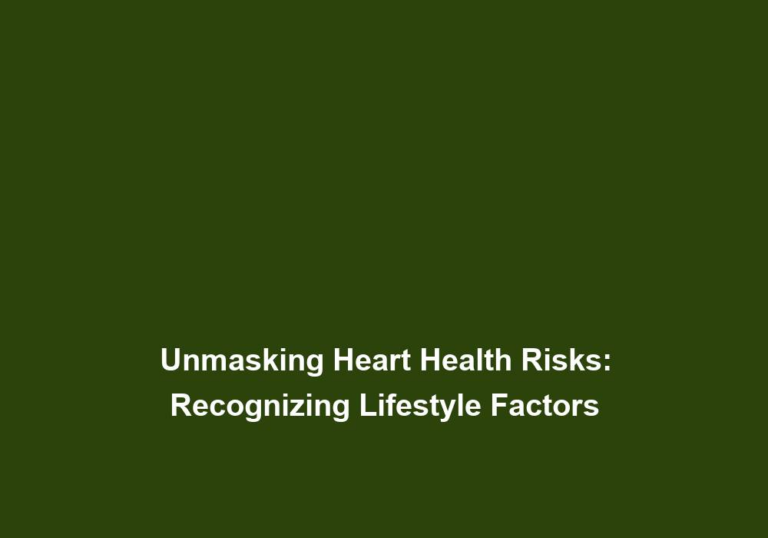Cheers to Heart Health: Understanding Alcohol’s Effects
Alcohol has long been a topic of debate when it comes to its effects on our overall health, particularly our heart health. While excessive alcohol consumption can have detrimental effects, moderate drinking has been associated with certain benefits. In this article, we will delve into the effects of alcohol on our cardiovascular system and discuss the key factors to consider for maintaining a healthy heart while enjoying the occasional drink.
The Moderate Alcohol Consumption Guidelines
Before we dive into the effects of alcohol on heart health, it is essential to understand what constitutes moderate drinking. Moderate alcohol consumption is defined as:
- Up to one drink per day for women
- Up to two drinks per day for men
It is important to note that these guidelines are not meant to encourage non-drinkers to start consuming alcohol. Non-drinkers cannot be advised to begin drinking for potential health benefits, as the risks may outweigh the benefits. Additionally, these guidelines apply only to healthy adults and should be adjusted for individuals with certain medical conditions or those taking medications that interact with alcohol.
Benefits of Moderate Alcohol Consumption for Heart Health
Moderate alcohol consumption, when done responsibly and within the recommended guidelines, has been associated with several potential benefits for heart health. Let’s take a closer look at these benefits:
-
Increased HDL Cholesterol: HDL cholesterol, often referred to as good cholesterol, plays a crucial role in removing low-density lipoprotein (LDL) cholesterol, or bad cholesterol, from the arteries. Moderate alcohol consumption has been shown to increase HDL cholesterol levels, thereby reducing the risk of cardiovascular diseases. This effect can be attributed to the presence of polyphenols in alcoholic beverages, which have antioxidant properties and can help improve cholesterol levels.
-
Reduced Blood Clotting: Alcohol acts as a natural blood thinner, inhibiting the formation of blood clots. When blood clots form and block the blood flow to the heart or brain, it can lead to heart attacks or strokes. By reducing blood clotting, moderate alcohol consumption can help maintain a healthy blood flow and prevent such cardiovascular events. However, it is important to note that excessive alcohol consumption can have the opposite effect and increase the risk of bleeding disorders.
-
Lower Risk of Heart Disease: Several studies have suggested that moderate alcohol consumption may lower the risk of developing heart disease, particularly coronary artery disease. This benefit is believed to be associated with alcohol’s ability to raise HDL cholesterol levels, improve insulin sensitivity, and reduce inflammation within the cardiovascular system. Additionally, certain alcoholic beverages like red wine contain antioxidants, such as resveratrol, which have been shown to have protective effects on the heart.
-
Relaxation and Stress Reduction: Moderate alcohol consumption can have a relaxing effect on the body, helping to alleviate stress. Chronic stress is known to contribute to heart disease, so finding healthy ways to manage stress is crucial for heart health. However, it is important to note that relying on alcohol as a coping mechanism for stress can lead to dependency and other negative health consequences.
Risks of Excessive Alcohol Consumption for Heart Health
While moderate alcohol consumption may have some potential benefits for heart health, it is essential to recognize the risks associated with excessive drinking. Let’s explore these risks:
-
High Blood Pressure: Regular and heavy drinking can lead to high blood pressure, also known as hypertension. High blood pressure is a significant risk factor for heart disease and other cardiovascular complications. Alcohol can raise blood pressure by stimulating the release of certain hormones and constricting blood vessels.
-
Increased Triglyceride Levels: Triglycerides, a type of fat found in the bloodstream, can increase when alcohol is consumed in excess. Elevated triglyceride levels are associated with an increased risk of heart disease. Excessive alcohol consumption can also contribute to weight gain, which further raises triglyceride levels and increases the risk of heart problems.
-
Cardiomyopathy: Prolonged excessive alcohol consumption can weaken and damage the heart muscle, leading to a condition known as cardiomyopathy. Cardiomyopathy can result in heart failure or other severe complications, as the heart becomes less efficient in pumping blood throughout the body. The risk of developing cardiomyopathy is higher in individuals who have a genetic predisposition or a history of heavy alcohol abuse.
-
Arrhythmias: Alcohol can disrupt the normal electrical signals of the heart, leading to irregular heart rhythms or arrhythmias. These abnormal heart rhythms can be potentially life-threatening and increase the risk of stroke or cardiac arrest. Excessive alcohol consumption can also trigger atrial fibrillation, a common type of arrhythmia that can significantly impact heart health.
Moderation is Key
While moderate alcohol consumption may offer some potential benefits for heart health, it is crucial to emphasize moderation and responsible drinking. Here are some key points to keep in mind:
-
Know your limits: Understand the recommended guidelines for moderate alcohol consumption and stick to them. Going overboard can negate any potential benefits and increase the risk of adverse effects on your heart health. It is important to note that individuals with certain medical conditions, such as liver disease, should abstain from alcohol entirely.
-
Listen to your body: Pay attention to how alcohol affects your body. If you notice any negative effects or if you have a family history of alcohol-related issues, it is best to consult with a healthcare professional before continuing or starting any alcohol consumption. They can provide personalized advice based on your specific health circumstances.
-
Balance with a healthy lifestyle: Alcohol should never be seen as a substitute for a healthy lifestyle. Maintain a balanced diet rich in fruits, vegetables, whole grains, and lean proteins. Engage in regular physical activity, such as aerobic exercises, strength training, and flexibility exercises. Avoid other risk factors such as smoking to support your overall heart health.
-
Avoid binge drinking: Binge drinking, or consuming a large amount of alcohol in a short period, can have severe consequences for your heart health. It is important to spread your moderate alcohol consumption throughout the week and avoid excessive drinking on any given occasion. Binge drinking not only increases the risk of immediate harm but also contributes to long-term health issues.
Conclusion
In conclusion, moderate alcohol consumption, within the recommended guidelines, may offer some potential benefits for heart health. Increased HDL cholesterol levels, reduced blood clotting, and a lower risk of heart disease are among the potential benefits associated with responsible drinking. However, it is essential to balance these potential benefits with the risks of excessive alcohol consumption, including high blood pressure, increased triglyceride levels, cardiomyopathy, and arrhythmias. Moderation, responsible drinking, and a healthy lifestyle should always be prioritized for optimal heart health. Cheers to a healthy heart!

